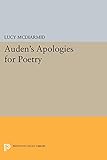Auden's Apologies for Poetry / Lucy McDiarmid.
Material type: TextSeries: Princeton Legacy Library ; 1059Publisher: Princeton, NJ : Princeton University Press, [2014]Copyright date: ©1990Edition: Course BookDescription: 1 online resource (198 p.)Content type:
TextSeries: Princeton Legacy Library ; 1059Publisher: Princeton, NJ : Princeton University Press, [2014]Copyright date: ©1990Edition: Course BookDescription: 1 online resource (198 p.)Content type: - 9780691603797
- 9781400860845
- 811.52 20
- PR6001.U4
- online - DeGruyter
- Issued also in print.
| Item type | Current library | Call number | URL | Status | Notes | Barcode | |
|---|---|---|---|---|---|---|---|
 eBook
eBook
|
Biblioteca "Angelicum" Pont. Univ. S.Tommaso d'Aquino Nuvola online | online - DeGruyter (Browse shelf(Opens below)) | Online access | Not for loan (Accesso limitato) | Accesso per gli utenti autorizzati / Access for authorized users | (dgr)9781400860845 |
Frontmatter -- Contents -- Preface -- Acknowledgments -- Abbreviations -- INTRODUCTION. The Finest Tumbler of His Day -- CHAPTER ONE. Pardon and "Pardon" -- CHAPTER TWO. The Generous Hour: Poems and Plays of the 1930s -- CHAPTER THREE. The Other Side of the Mirror: New Year Letter, For the Time Being, and The Sea and the Mirror -- CHAPTER FOUR. Apologies for Poetry: Poems 1948-1973 -- CONCLUSION. Writing This for You to Open When I Am Gone -- APPENDIX. The Manuscript Drafts of New Year Letter, Part III, Opening Passage -- Index
restricted access online access with authorization star
http://purl.org/coar/access_right/c_16ec
Common wisdom has it that when Auden left England for New York in January 1939, he had already written his best poems. He left behind (most critics believe) all the idealisms of the 1930s and all serious concerns to become an unserious poet, a writer of ingenious, agreeable, minor lyrics. Lucy McDiarmid argues that such readers, spoiled by the simple intensities of apocalypse, distort and misjudge Auden's greatest work. She shows that once Auden was freed from the obligation to criticize and reform the society of his native country, he devoted his imaginative energies to commentary on art. And about art he was never complaisant: with greater passion than he had ever used to undermine "bourgeois" society, Auden undermined literature. Every major poem and every essay became a retractio, a statement of art's frivolity, vanity, and guilt. Auden's Apologies for Poetry, then, sets forth the unorthodox notion that the chief subject of later, "New Yorker" Auden is the insignificance of poetry. Commenting on all the major poems and essays from the 1930s through the 1960s, and analyzing manuscript revisions and unpublished works, it charts the changes in Auden's poetics in the light of his shift from an oral to a written model of poetry. In his earliest work Auden voices the tentative hope that poems can be like loving spoken words, transforming and redeeming, themselves carriers of value. After 1939 he takes for granted a written model. His later essays and poems deny art spiritual value, claiming that "love, or truth in any serious sense" is a "reticence," the unarticulated worth that exists--if at all--outside the words on the page. Later Auden creates a poetics of apology and self-deprecation, a radical undermining of poetry itself.Originally published in 1990.The Princeton Legacy Library uses the latest print-on-demand technology to again make available previously out-of-print books from the distinguished backlist of Princeton University Press. These editions preserve the original texts of these important books while presenting them in durable paperback and hardcover editions. The goal of the Princeton Legacy Library is to vastly increase access to the rich scholarly heritage found in the thousands of books published by Princeton University Press since its founding in 1905.
Issued also in print.
Mode of access: Internet via World Wide Web.
In English.
Description based on online resource; title from PDF title page (publisher's Web site, viewed 30. Aug 2021)


